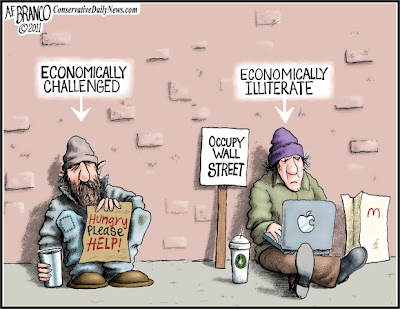November 28, 2011
November 27, 2011
New Occupy Posters
flush out
Update: You can send your pictures or comments directly to me at onemansthrone@gmail.com
November 21, 2011
BREAKING NEWS - Good Bye OWS - Toronto
 |
| Dear Occupy Toronto, Fuck off! Love, Mayor Rob Ford |
November 17, 2011
Why OWS Will Fail
2. They are too Divided
3. They have no Leader
November 15, 2011
Watch This: Bullshit
November 14, 2011
November 13, 2011
Read this: Ocuppiers Right, Wrong
 |
| Source: Toronto Sun |
SEIU Now Collecting Dues from Medicaid Payments Meant for Disabled Kids | The Weekly Standard
There are a number of bizarre schemes unions have used to coerce dues out of public funds. For a long time, I thought the most appalling example was a Michigan scheme where the United Auto Workers and the American Federation of State, County and Municipal Employees held a sham vote-by-mail organizing election that "unionized" Michigan's home daycare providers largely against their will. This allowed them to collect union dues from state chid care subsidies.
However, it turns out there are even worse union scams happening in Michigan right now. Joel Gehrke at the Washington Examiner reports:
If you're a parent who accepts Medicaid payments from the State of Michigan to help support your mentally-disabled adult children, you qualify as a state employee for the purposes of the Service Employees International Union (SEIU). They can now claim and receive a portion of your Medicaid in the form of union dues.
Robert and Patricia Haynes live in Michigan with their two adult children, who have cerebral palsy. The state government provides the family with insurance through Medicaid, but also treats them as caregivers. For the SEIU, this makes them public employees and thus members of the union, which receives $30 out of the family's monthly Medicaid subsidy. The Michigan Quality Community Care Council (MQC3) deducts union dues on behalf of SEIU.
The SEIU takes $6 million a year that would otherwise go to helping disabled children. Unions seem to wonder why they are under attack these days, but you read reports like this and it's not exactly a mystery why more and more Americans are fed up.
Source: http://www.weeklystandard.com


















